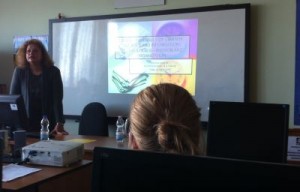BEST PRACTICES FOR IMPLEMENTATION OF ICT IN LIFELONG LEARNING OF ELDERLY
Assoc. Prof. Dr. Mariela Nankova, State University of Library Studies and Information Technologies (SULSIT), Sofia, Bulgaria
 Here are some of my observations from practice:
Here are some of my observations from practice:
Using the services of a global network the teacher has the opportunity to turn the learning process into an attractive occupation for which are characteristic spontaneity of reactions, freedom of thought and creative response [1].
Very good tool to support adult learning, in certain situations, it is the computer. Multimedia training has the advantage of combining many different types of information and presenting it in the best shape (graphics, image, table, etc.) to ensure easy understanding of the material. The possibilities for the use of computer training are high. These multimedia may be presented on it [2]:
• Texts – further scientific information, quizzes to test the knowledge and skills of trainees;
• Tables – systematic data from research studies on specific scientific knowledge;
• Graphics -for displaying data related to training, schematic representation of processes, etc .;
• Images – images of objects related to the studied material;
• references to specific training sites. In this kind of network sites students acquire knowledge about the processes occurring in the scientific field of modern methods of research the latest scientific achievements in the scientific field that interests them. These features are used to enhance the general culture of the students and facilitate their training in certain subjects on the syllabus.
Information technology will not displace older methods and provide new opportunities for their realization.
In our opinion “E” training is a way for older students to be more satisfied with their knowledge and skills. Students have mastered the knowledge of the discipline while looking, adding experimenting and learning new and interesting events and facts on the blackboard or even the library could not find such a compact. In this way, their curiosity and interest in learning new things became entertaining and useful and also helped them learning, which is confirmed by the final grade. So the ICT training offers students the opportunity to keep pace with new ubiquitous entrants of information technologies and they develop innovative ways of thinking. Last but not least also teachers improve their skills and are able to contribute more to the information literacy of students.
INNOVATION IN THE FIELD OF E-LEARNING
Projects for the development and transfer of innovation should focus on the following elements:
– Promote training with the help of ICT, together with training in groups, family learning, creating virtual learning in international settings;
– The creation of training materials aimed at improving the skills of those who are most qualified;
– Development of training tools using ICT for quality management, considering vocational education students [11].
- Types of activities:
- – Support for the mobility of people in lifelong learning;
- – Bilateral and multilateral partnerships;
- – Common projects specifically designed to promote quality in education and training systems through the transnational transfer of innovation;
- – International and national projects;
- – Multilateral projects and networks;
- – Monitoring and analysis of policies and systems in the field of lifelong learning, regular checking and updating of reference material, including statistical studies, analyzes and indicators, action aimed at transparency and recognition of qualifications and prior learning, and action aimed at cooperation in the provision of quality training;
- – Subsidies and grants to support certain operational and administrative costs of organizations active in the area covered by the program “Lifelong Learning”;
- – Other initiatives aimed at achieving the objectives of the program.
- Who can participate:
- – students, trainees and graduates;
- – teachers, trainers and other staff involved in various aspects of lifelong learning;
- – people who are looking for work;
- – institutions and organizations offering opportunities in the context of the framework program “Lifelong Learning” or within the sub-programs;
- – individuals and bodies responsible for systems and policies concerning any aspect of lifelong learning at local, regional and national level;
- – environment such as enterprises, social partners and their organizations at all levels, including chambers of commerce;
- – organizations providing guidance, counseling and information services relating to any aspect of lifelong learning [3].
- – NGOs working in the field of lifelong learning, including students, instructors, students, teachers, parents’ associations;
- – research centers and organizations dealing with issues related to lifelong learning;
- – voluntary non profit organizations.
What will Bulgaria win since the introduction of lifelong learning?
Economic development, because constantly skilled people will be competitive in the labor market and hence social development because they will be more satisfied with their lives. Since lifelong learning is a requirement of the European Union, as a member-state Bulgaria’s access to EU funds.
What are the main themes of the strategy for LLL?
As in all member states and in Bulgaria the emphasis will be on equal access to education, national recognized qualifications and flexibility. The latter means the use of modern techniques such as distance and e-learning courses which are available and flexible for all people, regardless of age and their previous experience.
In this context, we can conclude that educational institutions including universities should plan their programs and projects related to continuing education, using all the opportunities that are given by the European scientific and educational programs for growth and knowledge provided of “lifelong learning”.
REFERENCES:
1. Bizhkov, G. Theory and methods of didactic tests. S., Prosveta, 1992.
2. Nankova, M. Interraction in Longlife Learning Programs for Adults, S., 2011.
3. Stoyanov, C. Virtual university aid training students. National Scientific Conference “Informatics in scientific knowledge”, 2002, Varna.
